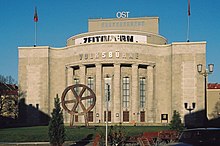Volksbühne


The Volksbühne ("People's Theatre") is a theater in Berlin. Located in Berlin's city center Mitte on Rosa-Luxemburg-Platz (Rosa Luxemburg Square) in what was the GDR's capital. It has been called Berlin's most iconic theatre.[1]
About
[edit]The Volksbühne was built during the years 1913 to 1914 and was designed by Oskar Kaufmann, with integrated sculpture by Franz Metzner, who had both previously collaborated on the Ufa-Pavillon am Nollendorfplatz cinema in 1912–1913.[2] It opened on December 30, 1914[3] and has its origin in an organization known as the "Freie Volksbühne" ("Free People's Theater") founded in 1890 by Bruno Wille and Wilhelm Bölsche,[4] which sketched out the vision for a theatre "of the people" in 1892. The goal of the organization was to promote the naturalist plays of the day at prices accessible to the common worker. The original slogan inscribed on the edifice was "Die Kunst dem Volke" ("The art to the people"). Two of the earlier artistic directors were the innovative Max Reinhardt from 1915 to 1918, and during the Weimar Republic the socio-political theatre reformer Erwin Piscator in 1924–1927.
During World War II, the theatre was heavily damaged like much of the rest of Berlin. From 1950 to 1954, it was rebuilt according to the designs of architect Hans Richter.
Frank Castorf became director in 1992. During his 25-year tenure, through mid 2017, the theater's ambitious, experimental productions, brought it worldwide recognition as a leading European venue.[5][6]
In 2015 the City of Berlin announced that Castorf would be replaced by Chris Dercon in 2017,[7][8] who himself resigned in April 2018 after what was considered by many to have been a commercially and artistically weak period for the theater.[9][10]
Left-wing activists occupied the theater in September 2017.[11][1]
René Pollesch, a playwrite and director who was widely considered to be one of the leading voices of post-dramatic theatre in Germany, assumed the position of Artistic Director of the Volksbühne in 2021.[12][13][14] Pollesch passed away unexpectedly in February, 2024.[15][16]
After a year-long search, Berlin's government announced Matthias Lilienthal as the Volksbühne's new artistic director in February, 2025, joined by an artistic board of choreographers Florentina Holzinger and Marlene Monteiro Freitas.[17][18] Lilienthal, who worked as chief dramaturg at the Volksbühne between 1991 and 1998 under Frank Castorf, has previously led the HAU - Hebbel am Ufer and the Münchner Kammerspiele.[19] He, Holzinger, and Freitas will begin their tenure in August, 2026.[20]
References
[edit]- ^ a b "An escalating row over the future of Berlin's most iconic theatre". The Economist. 5 October 2017.
- ^ Nachtlicht, Leo (1914). "Das Kinotheater "Cines" am Nollendorfplatz von Architekt Oskar Kaufmann, Berlin". Berliner Architekturwelt (in German). 16 (2): 58–60. Retrieved 10 October 2016.
- ^ "100 Years of Volksbühne in Berlin" (in German). Berliner Morgenpost. 30 December 2014.
- ^ "Projektbeschreibung • Deutsche Philologie • Fachbereich Philosophie und Geisteswissenschaften". Archived from the original on 2018-09-16. Retrieved 2018-09-15.
- ^ Rogers, Thomas (12 September 2017). "In Berlin, an Iconic Theater Gets a New Leader. Cue the Protests". New York Times. nytimes.com. Retrieved 26 September 2017.
- ^ Slawson, Nicola (24 September 2017). "'Not acceptable’: head of Berlin theatre hits out at Volksbühne occupation". The Guardian. theguardian.com. Retrieved 26 September 2017.
- ^ "Tate Modern Director, Chris Dercon, to Step Down". New York Times. 24 April 2015. Retrieved April 28, 2015.
- ^ Oltermann, Philip (1 December 2016). "Revolt at the Volksbühne: behind the scenes at Berlin's troubled theatre". The Guardian. Retrieved 4 December 2016.
- ^ "Chris Dercon Steps Down as Director of Berlin's Radical Volksbühne Theatre After Brief, Turbulent Tenure". frieze.com. 13 April 2018. Retrieved 2018-08-23.
- ^ Eddy, Melissa. "Protest-Hit Director Quits Berlin Theater". Retrieved 2018-08-23.
- ^ Rogers, Thomas (September 24, 2017). "Activists Occupy Volksbühne Theater in Berlin as Conflict Widens". The New York Times. ISSN 0362-4331.
- ^ "Pollesch und die neue Leitung an der Berliner Volksbühne". FAZ.NET (in German). 2021-12-15. Retrieved 2025-02-11.
- ^ Theaterverlag, Michael Merschmeier, Der. "Das TheaterMagazin - Einzelansicht". Der Theaterverlag (in German). Retrieved 2025-02-11.
{{cite web}}: CS1 maint: multiple names: authors list (link) - ^ Marshall, Alex (2019-06-12). "Volksbühne Theater in Berlin Names Artistic Director, Ending Leadership Crisis". The New York Times. ISSN 0362-4331. Retrieved 2025-02-11.
- ^ Goldmann, A. J. (2024-02-29). "René Pollesch, Provocative Force in German Theater, Dies at 61". The New York Times. ISSN 0362-4331. Retrieved 2025-02-11.
- ^ Oltermann, Philip; editor, Philip Oltermann European culture (2024-02-27). "René Pollesch, maverick German theatre director, dies aged 61". The Guardian. ISSN 0261-3077. Retrieved 2025-02-11.
{{cite news}}:|last2=has generic name (help) - ^ Rogers, Thomas (2025-02-07). "Troubled Volksbühne Theater Announces Another New Director". The New York Times. ISSN 0362-4331. Retrieved 2025-02-11.
- ^ Höbel, Wolfgang (2025-02-07). "(S+) Meinung: Matthias Lilienthal / Volksbühne: Eine vernünftige Wahl – und vermutlich die letzte Chance des berühmten Theaters". Der Spiegel (in German). ISSN 2195-1349. Retrieved 2025-02-11.
- ^ tagesschau.de. "Matthias Lilienthal übernimmt Leitung der Berliner Volksbühne". tagesschau.de (in German). Retrieved 2025-02-11.
- ^ "Matthias Lilienthal übernimmt Leitung der Berliner Volksbühne". www.rbb24.de (in German). 2025-02-08. Retrieved 2025-02-11.
External links
[edit]52°31′37″N 13°24′43″E / 52.52694°N 13.41194°E
